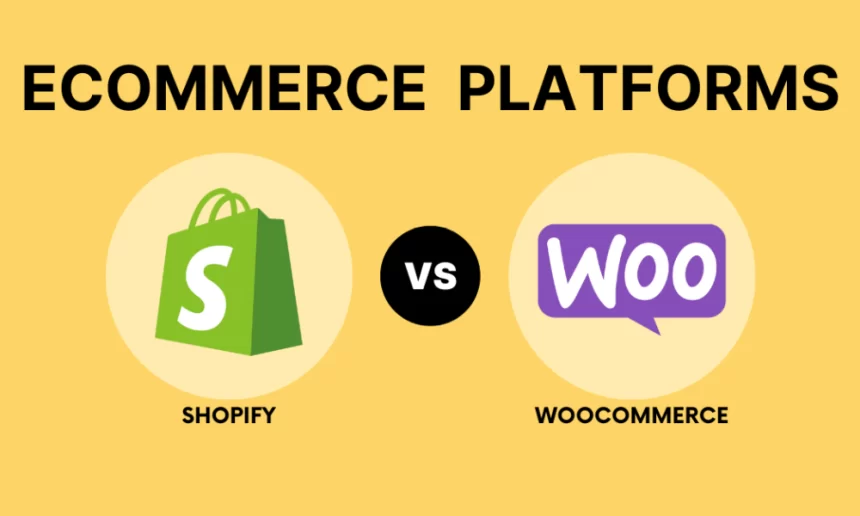E-commerce has revolutionized the way businesses operate, enabling entrepreneurs to reach a global audience. When setting up an online store, selecting the right e-commerce platform is crucial. Two of the most popular platforms are Shopify and WooCommerce. This blog will provide a comprehensive comparison between Shopify and WooCommerce, helping you determine which platform is best suited for your business needs.
Introduction
Choosing the right e-commerce platform can be the difference between the success and failure of an online business. Shopify and WooCommerce are two leading platforms, each with its own strengths and weaknesses. This article will delve into various aspects of these platforms, including ease of use, pricing, features, scalability, and support.
Ease of Use
Shopify
Shopify is known for its user-friendly interface and simplicity. It is a hosted platform, which means Shopify takes care of all the technical aspects like hosting, security, and updates. This allows users to focus on building and managing their store. The platform offers a drag-and-drop builder, making it easy to design and customize your store without any coding knowledge.
WooCommerce
WooCommerce, on the other hand, is a WordPress plugin. This means that to use WooCommerce, you need to have a WordPress site. Setting up WooCommerce can be more complex compared to Shopify, as you need to handle hosting, security, and updates yourself. However, WooCommerce offers more flexibility and customization options, especially for users familiar with WordPress.
Pricing
Shopify
- Basic Shopify: $29/month
- Shopify: $79/month
- Advanced Shopify: $299/month
Each plan includes web hosting, SSL certificates, and access to Shopify’s full range of features. Additionally, Shopify charges transaction fees unless you use Shopify Payments.
WooCommerce
WooCommerce is a free plugin, but there are additional costs to consider:
- Hosting: $5 – $25/month
- Domain: $10 – $20/year
- SSL Certificate: $0 – $100/year (some hosts include this for free)
- Themes and Extensions: Varies
While WooCommerce itself is free, the overall costs can add up depending on your specific needs and the services you choose.
Features
Shopify
Shopify offers a wide range of features out of the box, including:
- Unlimited products
- Multiple sales channels (online store, social media, marketplaces)
- Abandoned cart recovery
- Shopify POS
- Professional themes
- Built-in SEO features
- Mobile optimization
- 24/7 customer support
Shopify also has an extensive app store, allowing you to extend the functionality of your store with shopify must-have apps for marketing, shipping, customer service, and more.
WooCommerce
WooCommerce is highly customizable and offers a plethora of features, including:
- Unlimited products
- Multiple payment gateways
- Extensive theme options (through WordPress)
- Mobile optimization
- Built-in blogging (through WordPress)
- SEO capabilities (enhanced with plugins like Yoast SEO)
- Inventory management
- Reporting and analytics
The true power of WooCommerce lies in its flexibility and the vast ecosystem of plugins available for WordPress, allowing you to add almost any functionality you can imagine.
Scalability
Shopify
Shopify is built to scale with your business. As a hosted solution, Shopify handles all the technical aspects of scaling, including server maintenance, security, and performance optimization. This makes it an ideal choice for businesses expecting rapid growth.
WooCommerce
WooCommerce can also scale, but it requires more hands-on management. As your business grows, you may need to upgrade your hosting plan, optimize your website for performance, and ensure that your site remains secure. WooCommerce’s scalability largely depends on the quality of your hosting provider and your technical expertise.
Support
Shopify
Shopify provides 24/7 customer support through live chat, email, and phone. Additionally, Shopify has a comprehensive help center, community forums, and extensive documentation to help you troubleshoot issues and learn more about the platform.
WooCommerce
WooCommerce support is more fragmented. While WooCommerce itself offers support for the core plugin, you may need to seek help from your hosting provider or third-party developers for issues related to hosting, themes, and plugins. The WooCommerce community is large and active, and there are many resources available, including forums, tutorials, and documentation.
SEO and Marketing
Shopify
Shopify offers built-in SEO features, such as customizable title tags, meta descriptions, and clean URLs. The platform also integrates with various marketing tools, including email marketing, social media advertising, and Google Analytics. Shopify’s app store provides additional marketing tools and plugins to enhance your store’s visibility and reach which is perfect for dropshipping.
WooCommerce
WooCommerce, through its integration with WordPress, offers robust SEO capabilities. Plugins like Yoast SEO can significantly enhance your store’s SEO performance. Additionally, WooCommerce allows for deep customization of marketing strategies, including content marketing through WordPress, email marketing, social media integration, and more.
Payment Gateways
Shopify
Shopify supports a wide range of payment gateways, including Shopify Payments, PayPal, Stripe, and many others. However, Shopify charges additional transaction fees if you use third-party payment gateways.
WooCommerce
WooCommerce also supports numerous payment gateways, including PayPal, Stripe, Square, and many more. Unlike Shopify, WooCommerce does not charge additional transaction fees, giving you more flexibility in choosing the best payment options for your business.
Customization
Shopify
Shopify offers a range of professional themes, both free and paid. While customization is possible, it is somewhat limited compared to WooCommerce. Shopify themes are designed to be easy to use and require minimal customization to look professional.
WooCommerce
WooCommerce excels in customization. Since it is built on WordPress, you can choose from thousands of themes and plugins to create a unique store. For those with coding knowledge, WooCommerce offers complete control over the design and functionality of your site.
Conclusion
Both Shopify and WooCommerce are powerful e-commerce platforms, each with its own strengths and weaknesses. Shopify is ideal for users looking for an all-in-one, easy-to-use solution with excellent customer support and scalability. It is particularly suited for businesses that prefer not to manage technical aspects like hosting and security.
WooCommerce, on the other hand, is perfect for those who want complete control over their store’s customization and are comfortable managing the technical aspects of running a website. Its flexibility and extensive range of plugins make it a versatile choice for businesses with specific needs.
Ultimately, the best platform for your business depends on your unique requirements, technical expertise, and budget. By carefully considering the features, costs, and scalability of each platform, you can make an informed decision that will set your e-commerce business up for success.








